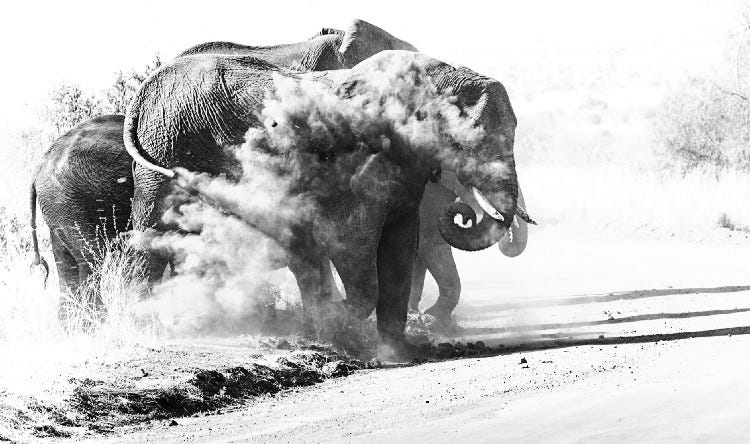Is It True That Whatever You Believe Is "True for You"?
Blind men, elephants and the abundance mindset

This post is Part 1 of a philosophy series called “Everything’s True At Once”, which argues that (a) we don’t believe things for the reasons we think we do; (b) any one of us can only see a small part of the overall truth; (c) most of our apparent disagreements consist of one person seeing the yin, the other seeing the yang and neither seeing how they fit together; (d) competing worldviews are more like different music genres than truth claims that are truer or falser than each other; (e) balance within society and the individual can only be achieved through diversity of opinion; and (f) a statement’s impact is more important than its accuracy.
This post tackles (a) and (b). It may or may not draw on some 19th century American philosophy, some ancient Indian storytelling and a couple of repurposed self-help terms.
‘I am learning that someone can disagree with me without either of us being wrong.’ - Anonymous
WHATEVER WORKS FOR YOU, MAAAAAN

As a C. S. Lewis-obsessed teenager who filled my time with philosophy, logic, Christian theology, doctrinal schisms and all that fun stuff, no phrase used to bother me more than ‘Whatever’s true is true for you.’ It smacked of relativism, glibness, the fuzziness of New Age spirituality (the enemy!!!) and above all laziness: don’t you care what the actual truth is? Aren’t you even gonna try?
But having spent my twenties and just over a year of my thirties questioning every certainty, expanding my intellectual horizons to include the most out-there speculations on the one hand and the most drastically secular perspectives on the other, understanding more and more about myself and how I work, coming up against the limitations of pure logic again and again, and even coming around to a lot of that New Age stuff, I’ve got to say that whatever you believe in is true for you. Kind of.
A lot of different tributaries have led me to this particular Lake of Relativism. As belief after belief of mine has proven to be insufficiently supported or not universally applicable, I’ve realised that all any of us have are more or less useful models of an unfathomably large reality. The more I’ve looked into the great philosophers the more I’ve realised just how much each one was responding to the pressures of the time and place in which they lived. Then there are the popular science articles that keep unmasking the physical foundations of my cosmic ideas (evolutionary biology, neuroscience) or turning them upside down altogether (theoretical physics). Then there are all the personality tests that show just how much our intuitions, motivations and belief systems follow predictable patterns. Or all those studies on how much our moral codes and political beliefs stem from our sensitivities, fears and other non-rational factors.
Finally, there are my observations about the people I know and what they believe about life. It’s often clear that their beliefs are doing some work for them, expressing their personality and values in some way, getting them out of bed in the morning. (This goes for lack of belief too: atheism is just as motivated by attachment and aversion as religious faith is.) Maybe some of my friends think they’ve figured all their convictions out logically from first principles — I don’t know — but it’s obvious to me they haven’t. Their beliefs just fit their personalities too well. Sometimes someone will say they “just have a feeling” about something. But where does the feeling come from if not the person’s own nature, their psychological makeup?
It’s both easier and harder to turn the spotlight on my own beliefs and practices. Easier because I know more about them, harder because it’s such an unpleasant, threatening process. Let’s see: why do I like meditating? Because I enjoy stillness and my own company, and feel a strong pull towards anything that gets me away from my habitual surroundings and thoughts. I’m sure many people feel they don’t need the practice because they get enough juice out of life without it.
Let’s see again: why do I feel an instinctive resistance towards any teachings that emphasise finding yourself through serving others? Because I’d rather get myself out of the hole before I start trying to pull anyone else out. There are plenty of teachings that agree with me on that order of things, so they’re the ones I gravitate towards. I could “unmask” dozens more of my spiritual inclinations this way, but you get the gist.

Basically, I agree with the American pragmatist philosophers when they say that people are oriented towards survival — physical, emotional, relational — over accuracy. That just as reason is the slave of the passions, truth is the slave of function. That for imperfect beings on an imperfect planet, truth is mostly a matter of “whatever works”.
We choose the models of reality we put our faith in and (more importantly) live our lives by based mostly on instinct and gut feeling, and use reason to explain our decisions to ourselves afterwards. And our instincts aren’t looking for the Absolute Universal Truth, they’re looking out for our own interests — steering us towards the gurus we most resonate with and the beliefs and actions that best serve us, fulfil us, help us live rich and useful lives.
In the sense that our gut picks our beliefs, our beliefs fire up our motivations, our motivations inform our actions and our actions shape our spiritual path, whatever we believe in is “true for us”.
Pretty depressing stuff, right? How trapped in our own psyches we are. How much truth-seeking is simple bias confirmation.
But the more I think about it, the more I’m convinced that this is a glass-half-empty way to look at things. Have you ever come across the terms “scarcity mentality” and “abundance mindset”? As this article has it, ‘Scarcity mentality refers to people seeing life as a finite pie, so that if one person takes a big piece, that leaves less for everyone else…An abundance mindset refers to the paradigm that there is plenty out there for everybody.’ As with so many self-help concepts, this distinction sounds kind of glib and annoying at first, but if you think about it long enough it turns out to be too practical and mind-expanding to ignore.
So take the statement ‘There’s only one objective reality, and we’re all bad at finding out anything about it because our emotional biases get in the way.’ True as far as it goes, but it’s demotivating. It puts a negative spin on the situation. It’s the philosophical version of a scarcity mentality. You see the same small-mindedness at play in my self-unmaskings above: I don’t just meditate out of introversion and alienation, and I’m not entirely focused on my own spiritual walk over other people’s (if I were, would I be writing this blog?). And so on.
So what does a philosophical abundance mindset look like? It starts by admitting that there’s some correspondence between Things As They Are To Us and Things As They Are. (Some people say they doubt this, but I don’t believe them because talk is cheap: no-one acts from a position of 100% skepticism because all action is based on faith.) If our temperament and our location in space and time are limitations stopping us from seeing the Whole Thing, they’re also portals through which we experience a corner of the Thing that no-one else has, or has ever had, access to. Yes, our gut only steers us towards certain aspects of the truth. But on the other hand, it steers us towards certain aspects of the truth.
The best part is that your emotional lacks and psychological limitations may steer you towards one spiritual practice over another when you’re starting out, but they aren’t the things that sustain you in it. The beginning of a journey isn’t the same as the end. Follow any meaningful path far enough and you find that your perspective and your very self start to expand out wider and wider the deeper you go. People’s lives can be utterly transformed by relationships they entered into half-heartedly and babies they conceived by accident. So there’s no telling where a freely chosen spiritual discipline can take you.
THE BLIND MEN AND THE ELEPHANT

For me, the philosophical abundance mindset finds its fullest expression in the ancient Indian parable of the blind men and the elephant. In the story, a group of blind men encounter an elephant for the first time and learn about it by touching it. One feels the tail and says the creature’s furry; another feels a tusk and says it’s hard and smooth; another feels the trunk and says it’s snakelike; and so on. One way of looking at it is that they’re all wrong. The other way of looking at it is that they’re all partially right, and they all have something to learn from each other.
Say none of them listen to each other and each of them goes home convinced that only he was “right” about the elephant. Then all of them have a vague idea about what one aspect of an elephant is like. But say one of them is more open-minded than the others and takes all of their descriptions on board. He still has no real idea what an elephant looks like: the dimensions, the colours, the way everything fits together. But he’s got a much fuller view than he’d have had if he’d stayed locked in his own perspective. And if I didn’t know what an elephant was myself I’d rather listen to his account than any of the others’.
I get four things from this:
(1) None of us know what the universe is really like. And we never will.
(2) But we all know what a little piece of it is like, because it’s been revealed to us through the unique perspective that comes with our location in space and time, our upbringing, our genes, our personality, our experiences, our thought processes, all of it.
(3) Putting that unique worldview out there is doing the rest of the world a favour. Not because it’s “right”, but because no-one else has it. We’re adding another splash of paint to the canvas.
(4) The less we experience other people’s worldviews as threats, competitors or abominations, and the more we incorporate the aspects of them we resonate with into our own worldviews, the more complete our picture of reality will be. Everyone we meet has the potential to teach us something, even the people we dislike or disagree with on nearly everything. Even that bigot.
All of which leads me to the rest of my essay. Coming soon.




